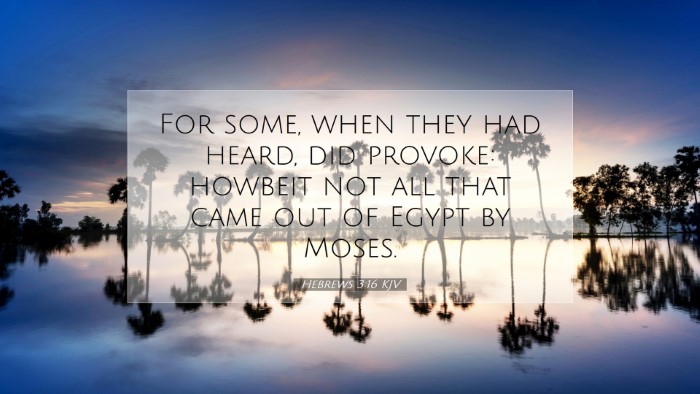Old Testament
Genesis Exodus Leviticus Numbers Deuteronomy Joshua Judges Ruth 1 Samuel 2 Samuel 1 Kings 2 Kings 1 Chronicles 2 Chronicles Ezra Nehemiah Esther Job Psalms Proverbs Ecclesiastes Song of Solomon Isaiah Jeremiah Lamentations Ezekiel Daniel Hosea Joel Amos Obadiah Jonah Micah Nahum Habakkuk Zephaniah Haggai Zechariah MalachiHebrews 3:16
Hebrews 3:16 KJV
For some, when they had heard, did provoke: howbeit not all that came out of Egypt by Moses.
Hebrews 3:16 Bible Commentary
Commentary on Hebrews 3:16
The epistle to the Hebrews is a profound exploration of Christ's superiority over the Mosaic Law and its institutions. In Hebrews 3:16, the author reminds the readers of the Israelites' rebellion in the wilderness, particularly their disobedience to God’s commands. This verse serves as a sobering warning about the consequences of unbelief and hard-heartedness towards God’s voice.
Text of Hebrews 3:16
"For who, having heard, rebelled? Indeed, was it not all who came out of Egypt, led by Moses?"
Contextual Overview
The context of Hebrews 3 centers on the comparison between Jesus and Moses. The author presents Jesus as a faithful Son over God’s house, while Moses was a servant in that house. This contrast emphasizes the greatness of Christ’s mission and message.
Insights from Commentaries
Matthew Henry
Matthew Henry notes that this verse addresses the tragic history of Israel in the wilderness. He emphasizes that the Israelites, despite witnessing miraculous deliverance from Egypt, chose to rebel against God. This rebellion stemmed from a deeper issue: their hardened hearts. Henry warns that even today, hearing God’s word does not guarantee obedience, as active rejection of divine guidance remains a persistent temptation.
Albert Barnes
Albert Barnes elaborates on the instances of rebellion mentioned in this verse. He identifies key moments, such as the bitter waters at Marah and the scarcity of food, which led to the people's grumbling and lack of faith. Barnes underscores that this rebellion provides a significant lesson for believers. One can hear God’s word and still choose to reject it, making the act of listening an insufficient indicator of faithfulness. He urges readers to not only listen but also respond with faith and obedience.
Adam Clarke
Adam Clarke provides a detailed investigation of the historical background. He points out that the Israelites' experience of liberation should have fostered gratitude and faithfulness. Clarke emphasizes the irony of their disobedience; those who had been chosen and liberated turned their backs on God. He advises contemporary readers to consider their own spiritual condition, warning against the dangers of familiarity leading to complacency and rebellion. Clarke insists that awareness of God’s past faithfulness must breed present trust and obedience.
Theological Implications
At its core, Hebrews 3:16 serves as a reminder for spiritual leaders and believers alike of the importance of fidelity to God’s voice. The implications are manifold:
- Hearing vs. Obeying: True faith is demonstrated through obedience to God’s word, not merely through acknowledgment.
- Historical Reflection: The author calls us to reflect on the past as a means to inform our current faith; history serves as a teacher.
- Heart Condition: The state of our hearts—soft or hard—influences our receptivity to God’s leading.
Application for Today's Believers
For pastors, theologians, and students of the word, applying this verse means conducting sober reflection on personal and corporate faith; assessing how past experiences of God’s goodness influence present behaviors is crucial.
- Engagement with Scripture: Regular and reflective study of the Scriptures allows believers to remember the characteristics of God, which fosters a responsive heart.
- Community Accountability: Believing communities must hold each other accountable to encourage faithful living against the societal tide of rebellion.
- Continual Repentance: Recognizing the tendency towards hardness of heart, believers should cultivate a practice of repentance and renewal.
Conclusion
Hebrews 3:16 serves as a powerful exhortation. It masters the duality of hearing God’s word and the vital necessity of responding in obedience. The insights from Matthew Henry, Albert Barnes, and Adam Clarke provide a timeless reminder for believers today: witnessing God’s power requires a corresponding commitment to His commands. May we take heed of the lessons from Israel's past, ensuring that our hearts remain open to His leading.


